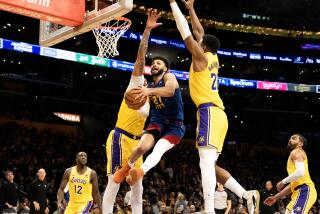Still A Catch Phrase
PITTSBURGH — He had just watched in amazement from his upper-level seat as Terry Bradshaw’s pass bounced seven yards backward off somebody’s shoulders and directly at the feet of running back Franco Harris.
He had just watched Harris grab the ball and run 42 yards for a miracle touchdown, giving the Pittsburgh Steelers a last-second victory over the Oakland Raiders in a 1972 playoff game, transforming years of desperation into an eventual dynasty.
He had also just had a couple of glasses of wine.
Thus fortified, marketing executive Michael Ord stood on a chair in a smoky downtown tavern here, tapped his glass with a spoon, and announced his latest idea:
“Today will be forever known as the feast of the Immaculate Reception.”
The bar crowd roared. Ord thought, hmmmm.
After several more drinks, moments before the telecast of the nightly news, he begged his girlfriend to call a local sportscaster and give him the phrase.
She laughingly phoned, never thinking anybody would answer. But somebody did.
“I walked out of the bathroom, looked up at the TV, heard them talking about ‘the Immaculate Reception,’ ” Ord remembers. “I thought, ‘What have I done?’ ”
Twenty-five years later, the magic remains. The play cited as the most memorable touchdown in NFL history still grips the hearts of a once-sagging city, its swagger immaculately restored.
Twenty-five years later, on the eve of the young Steelers’ AFC championship game against the veteran Denver Broncos, the fans here are noisily queuing up for another hometown miracle.
The man who coined what may be pro football’s most famous phrase is one of them.
Michael Ord’s wife is in a coma, in a hospice, dying of lung cancer.
He is praying that she lives at least through Sunday.
“I want to watch the game with her,” he said. “Hang a Terrible Towel from the TV.”
Mesmerizing Play
It was a play that seemingly touched everyone who witnessed it at chilly Three Rivers Stadium, those 50,000 or so who were still there, those hundreds of thousands who claim they were.
Fathers pull out ticket stubs for their children. Brothers gather to watch videotape.
Jim Baker, the man who swiped the football, has squeezed 25 years of fame out of it.
Michael Ord brightens his wife’s final months with it.
But did anything touch John “Frenchy” Fuqua?
Even 25 years later, he’s not saying, and fans aren’t asking.
“Art Rooney [the late owner of the Steelers] told me to keep it an immaculate secret,” Fuqua said. “So I will.”
Which is just fine with the guys down at Tessaro’s, a bar-grill wedged among the row houses and meat markets of the city’s east end.
“I don’t know,” said ceramics executive Furman South, who attended that game with his family. “And I don’t need to know.”
This much is known:
It was Dec. 23, 1972.
The Steelers, in their first playoff game in the franchise’s 40-year history, trailed the Raiders, 7-6 with 22 seconds remaining.
The Steelers had fourth and 10 at their 40-yard line.
Bradshaw, the Steeler quarterback, threw a pass about 30 yards downfield to Fuqua.
Jack Tatum, Raider defensive back, hit Fuqua just as the ball arrived at the 35.
The ball popped into the air and caromed backward to Harris.
Harris picked it off his shoe tops at the Raider 42 and raced into the end zone.
The officials debated the play before ruling it a touchdown, giving the Steelers the victory.
Just in time to save them from being mobbed by a swarm of fans that had rushed the field.
John Madden, then Raider coach, went crazy.
The Raiders thought it was an illegal play because of a rule, since changed, that prohibited a player from tipping a pass to his teammate without a defensive player touching it first.
There exists no conclusive videotape.
“Even to this day, I’m still amazed,” Harris said.
Steeler linebacker Jack Ham, sitting on the sideline directly in front of the play, told the Pittsburgh Post-Gazette that he expected a penalty because he was sure the ball had hit Fuqua.
But a local college professor scientifically broke down the film and claimed it had hit Tatum.
Tatum says, “I came up and hit him from behind, and there wasn’t any way I could have made contact with that ball.”
Fuqua says, “I know what really happened . . . I can’t take it to my grave . . . but. . . . “
But he’s taking it to his grave.
A Changed City
“The Immaculate Reception” game did not win a championship. In fact, it did not propel the 1972 Steelers toward anything other than more failure.
A week later, they lost to the Miami Dolphins in the AFC title game.
But listening to the locals at Tessaro’s who were there, it was not about only one touchdown, one win, one more round of games.
It was about an attitude.
“It changed everything,” said Kelly Harrington, 44, who owns the joint. “It changed the way everyone felt, not just about the franchise, but the town.”
Furman South remembers how, after Harris scored, there was a hesitation by many old-timers who remained in the stands, everyone waiting for the referee to rule against them.
“This was a town that was so used to losing, so used to things being taken away from them, we expected it not to count,” he said.
He remembers what happened when it did count.
“Then it was like, the town started feeling good about itself again,” he said. “From then on, every year, there was hope.”
The team reveled in that hope.
Before that, the Steelers were 183-268-19.
Since, they have gone 256-159-1 with four NFL championships.
“It is like the football gods weren’t angry at the Steelers anymore,” said Guy Junker, a local sportscaster who sold hot dogs at that game. “This town’s image of rivers dotted with dark mills and long unemployment lines . . . all of that changed.”
The Game Ball
Jim Baker tucked the ball under his leather jacket and raced downfield, past the 40, the 50, the 40, the 30 . . . raced all the way to the parking lot.
Once there, he hailed a passing car and offered to pay the driver to take him safely to his car.
“I’ve got the game ball,” Baker said.
“No need to pay me,” the driver said. “Just let me touch the ball.”
It was then that Baker knew that his fight to grab the extra point kicked by Roy Gerela after Harris’ immaculate touchdown was worth it.
He was in the end zone with the mob and pounced on the ball after Gerela’s extra point kick bounced off a back wall.
He held on when several large men--Baker is 5-feet-5--tried to grab it. Then he ran like the dickens.
For 25 years, according to Baker, it has been worth it.
People have asked for his autograph. People have admired the original photos of him clutching the ball with his wife and son Sam, who was born a few days before the game.
He thinks it has even bolstered his large suburban Pittsburgh insurance business, what with everyone knowing that he is the guy with the ball.
Not that everyone has actually seen the ball. In fact, hardly anyone has seen it.
He keeps it locked in a safe. On the rare time he travels with it, the ball is in a plastic case, and watched by two security men.
Why doesn’t Baker donate it to some organization, so everyone can enjoy it?
Well, he once offered it to the Steelers for two lifetime season tickets, but they said no. And the football Hall of Fame?
“Well, I thought about that,” he said. “But right now, there’s just too many things going on.”
This Christmas, when Baker put his treasure under the tree for its usual two-week appearance, son Sam wondered again why his birthday always seems to get supplanted by that darn ball.
“What could I say?” Baker said.
So goes yet another mystery of “the Immaculate Reception.” A town was uplifted, a team was transformed, lives were changed.
Do you know if Frenchy Fuqua touched the ball? Do you really need to know?
More to Read
Go beyond the scoreboard
Get the latest on L.A.'s teams in the daily Sports Report newsletter.
You may occasionally receive promotional content from the Los Angeles Times.











